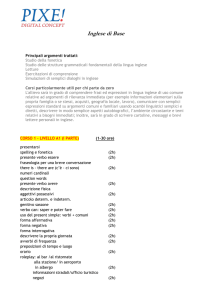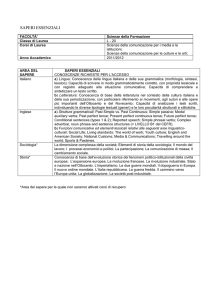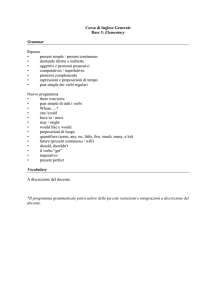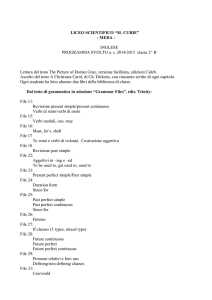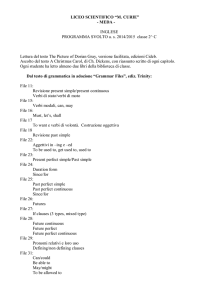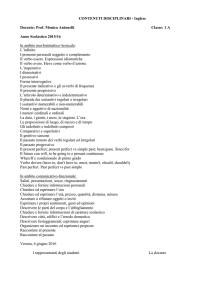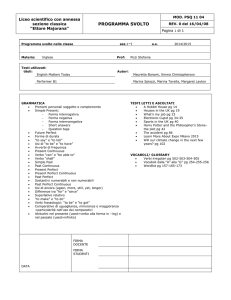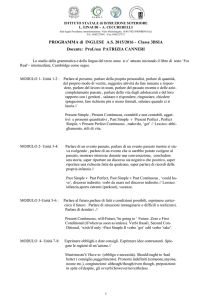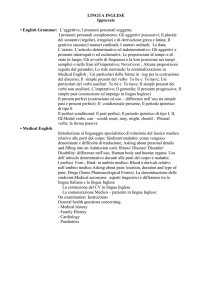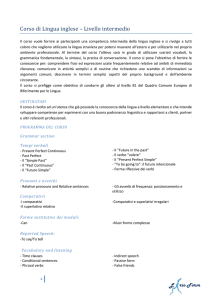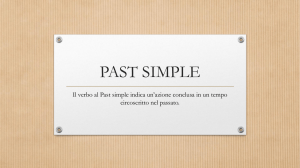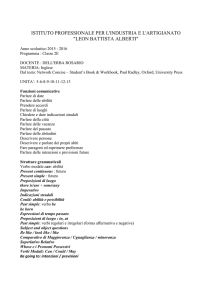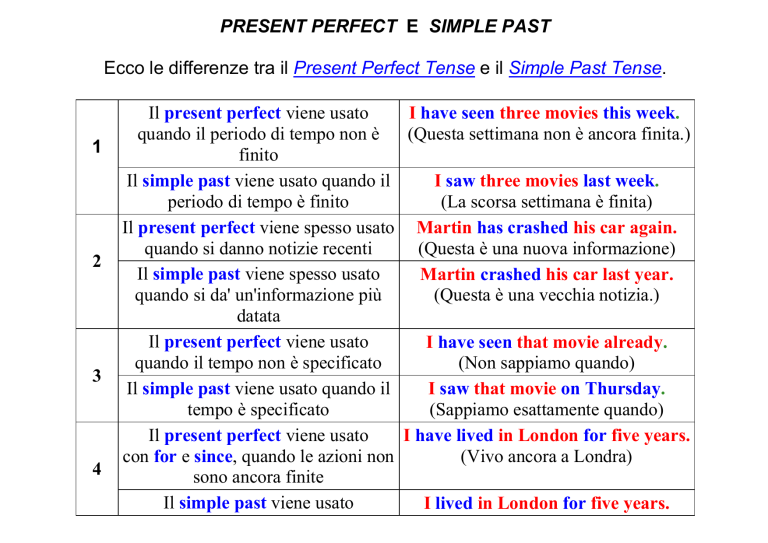
PRESENT PERFECT E SIMPLE PAST
Ecco le differenze tra il Present Perfect Tense e il Simple Past Tense.
1
2
3
4
Il present perfect viene usato
I have seen three movies this week.
quando il periodo di tempo non è
(Questa settimana non è ancora finita.)
finito
Il simple past viene usato quando il
I saw three movies last week.
periodo di tempo è finito
(La scorsa settimana è finita)
Il present perfect viene spesso usato Martin has crashed his car again.
quando si danno notizie recenti
(Questa è una nuova informazione)
Il simple past viene spesso usato
Martin crashed his car last year.
quando si da' un'informazione più
(Questa è una vecchia notizia.)
datata
Il present perfect viene usato
I have seen that movie already.
quando il tempo non è specificato
(Non sappiamo quando)
Il simple past viene usato quando il
I saw that movie on Thursday.
tempo è specificato
(Sappiamo esattamente quando)
Il present perfect viene usato
I have lived in London for five years.
con for e since, quando le azioni non
(Vivo ancora a Londra)
sono ancora finite
Il simple past viene usato
I lived in London for five years.
con for e since, quando le azioni
sono già finite
(Non vivo a Londra oggi)
Key words for Simple past:
Yesterday, last week ( month, year, Monday, etc) five years ago, two minutes ago, at five o’ clock (now are
six o’clock), all past expressions and
for and since (when actions are now finished)
Key words for present perfect
Just, already, yet,
for and since( when actions are not finished)
USO DEL PRESENT PERFECT TENSE
1: Azioni che sono cominciate nel passato e che continuano ancora
Il Present Perfect viene spesso usato per un'azione che è cominciata in qualche momento nel passato
e che sta ancora continuando ora. Spesso si usano le preposizioni for (con un periodo di tempo)
e since (con un momento preciso nel tempo) assieme al Present Perfect.Si traduce in italiano con il
presente semplice indicativo
He has lived in Italy for five years.
(Vive in Italia da 5 anni)
Ha cominciato a vivere in Italia 5 anni fa e ci vive ancora oggi
She has worked at the University since 2003.
(Lavora all'università dal 2003)
Ha cominciato a lavorare all'università nel 2003 e ci lavora ancora
oggi
2: Azioni che sono avvenute nel passato in un periodo imprecisato
Talvolta è importante dire che qualcosa è avvenuta o meno, ma non è altrettanto importante, o non si
sa, quando è avvenuta. Si traduce in italiano con il passato prossimo indicativo. Anche in questo caso
si può usare il Present Perfect usando avverbi come already, yet, just, ever o never. Questi avverbi
vanno di solito prima del participio passato all'interno della frase.
I've already seen that film. I don't want to see it again.
Non importa quando l' ho visto
Have you ever been to Germany?
Non importa quando sei stato in Germania, voglio solo sapere se ci sei stato o no
3: Azioni che sono accadute nel passato, ma hanno un effetto nel presente
Quest'uso è un po' più raro rispetto agli altri due. In questo caso l'azione avviene in qualche periodo nel passato, ma il suo effetto si fa ancora sentire al
presente. Si traduce in italiano con il passato prossimo indicativo. E' più facile comprendere quest'uso se paragoniamo le frasi con il Present Perfect a quelle con
il Simple Past.
TEMPO
FRASE
SIGNIFICATO
Present perfect
I've lost my keys.
Non ho ancora trovato le chiavi
Simple past
I lost my keys
yesterday.
Probabilmente le ho già ritrovate.
Present perfect
She's broken her
arm.
Il braccio è ancora ferito
Simple past
She broke her arm.
Il braccio è probabilmente già
guarito
Ecco una breve rivisitazione della costruzione e dell'uso del Present Perfect
Il present perfect si usa quando il periodo di tempo non è ancora
concluso
I have seen three movies this week.
(Questa settimana non è ancora finita)
Il present perfect si usa spesso quando il periodo di tempo non viene
menzionato
Gerry has failed his exam again.
Il present perfect si usa spesso quando il periodo di tempo è recente
Mary has just arrived in Rome.
Il present perfect viene spesso usato con for e since.
Greg has lived here for 20 years.
Greg has lived here since 1978.
Il present perfect si forma così:
have + past participle
FORMAZIONE DEL SIMPLE PAST dei VERBI REGOLARI
Il Simple Past Tense è uno dei tempi più comuni in inglese. La sua forma è la
stessa con tutti i soggetti: per i verbi regolari si aggiunge -ed alla forma base, ad
eccezione di pochi che cambiano un po' la parte finale.
Il Simple Past Tense può essere tradotto in italiano con l'imperfetto, il passato
prossimo e il passato remoto dell'indicativo, o con l'imperfetto del congiuntivo
VERBI CHE
TERMINANO IN...
COME COSTRUIRE IL SIMPLE
PAST
e
aggiungere -d
consonante + y
cambiare y in i, poi aggiungere -ed
1 vocale + 1 consonante
(ma non w o y)
raddoppiare la consonante, poi
aggiungere -ed
ESEMPIO
live - lived
date - dated
try - tried
cry - cried
unzip - unzipped
stop - stopped
tutti gli altri
aggiungere -ed
fill - filled
boil - boiled
work -worked
play -played
FORMAZIONE DEL SIMPLE PAST dei VERBI IRREGOLARI
I tre verbi irregolari più importanti sono be (essere), have (avere) e do (fare)
VERBO VERBO VERBO
PRONOME ESSERE AVERE FARE
(be)
(have)
(do)
I
was
had
did
You
were
had
did
He / She / It was
had
did
We
were
had
did
You
were
had
did
They
were
had
did
Altri verbi irregolari si dividono in 3 principali categorie:
CATEGORIA
verbi che non cambiano
cut - cut
ESEMPI
hit - hit fit - fit
cost - cost
verbi che cambiano la loro
vocale
verbi che cambiano
completamente
get - got sit - sat drink - drank come - came
catch - caught go - went
bring - brought
FORME INTERROGATIVA E NEGATIVA DEL SIMPLE PAST TENSE
La frase negativa e interrogativa del Simple Past si forma con
l'ausiliare did seguito dalla forma base del verbo principale.
FORMA NEGATIVA
Le negative del Simple Past sono formate aggiungendo didn't (informale) o did
not(formale) davanti alla forma base del verbo. Il verbo essere fa eccezione,
infatti è necessario aggiungere n't (informale) o not (formale) dopo was o were.
FRASE AFFERMATIVA
I had a car
You drank my beer
He was here yesterday
They were in the park
NEGATIVA
INFORMALE
I didn't have a car
You didn't drink my beer
He wasn't here yesterday
They weren't in the park
NEGATIVA FORMALE
I did not have a car
You did not drink my beer
He was not here yesterday
They were not in the park
FORMA INTERROGATIVA
Anche le interrogative vengono formate usando l'ausiliare did. Questa volta però,
l'ausiliare viene posto davanti al soggetto. Il verbo essere fa eccezione, infatti è
necessario porre il verbo essere davanti al soggetto, senza usare did.
FRASE AFFERMATIVA
He brought his friend
They had a party
You were here
She was sick
FRASE INTERROGATIVA
Did he bring his friend?
Did they have a party?
Were you here?
Was she sick?
SHORT ANSWERS - RISPOSTE BREVI
Le Short Answers sono brevi risposte date a domande che prevedono in genere un SI' o
un No e sono preferite alle risposte secche (SI'/NO). Si formano al passato semplice
utilizzando, dopo YES o NO, il soggetto sempre in forma di pronome personale seguito
daDID/DIDN'T. Eccone degli esempi:
YES/NO QUESTIONS - DOMANDE SI'/NO
Did they work in London?
SHORT ANSWERS
Yes, they did
No, they didn't
Did George and Michael work in London?
Did he drive to work?
Did Bob drive to work?
Yes, they did
No, they didn't
Yes, he did
No, he didn't
Yes, he did
No, he didn't
FORMAZIONE DELLE WH- QUESTIONS
Le Wh- questions (domande che iniziano con aggettivi o pronomi interrogativi
quali What, Where, When ecc) sono formate ponendo l'ausiliare did davanti al
soggetto (o nel caso del verbo essere, spostandolo davanti al soggetto),
aggiungendo all'inizio l'aggettivo o il pronome interrogativo WhAFFERMATIVA
INTERROGATIVA
Did the building fall
The building fell down
down?
They lived in London Did they live in London?
The shop was open
Was the shop open?
They were at home at 5 Were they at home at 5?
Wh- QUESTIONS
Why did the building fall down?
Where did they live?
Why was the shop open?
What time were they at home?
FORMAZIONE DEL PRESENT PERFECT TENSE
Il Present Perfect si forma con l'ausiliare have al presente più il participio
passato del verbo principale. Se il verbo è regolare il participio passato (Past
Participle) si forma aggiungendo -ed alla forma base. Alcuni verbi formano il
participio passato in modo irregolare. In questo schema vengono presentati il
verbo regolare walk e quello irregolareeat.
SOGGETTO
I
You
He
She
It
We
You
They
HAVE
have
have
has
has
has
have
have
have
PARTICIPIO PASSATO
walked / eaten
walked / eaten
walked / eaten
walked / eaten
walked / eaten
walked / eaten
walked / eaten
walked / eaten
Nota che il soggetto e l'ausiliare possono essere contratti
I've
You've
walked
walked
/
/
eaten
eaten
He's
She's
It's
We've
You've
They've
walked
walked
walked
walked
walked
walked
/
/
/
/
/
/
eaten
eaten
eaten
eaten
eaten
eaten
Con i verbi regolari il participio passato si forma allo stesso modo del Simple
Past, e cioè aggiungendo -ed alla fine del verbo, vedi FORMAZIONE
DEL SIMPLE PAST TENSE(VERBI REGOLARI). Per i verbi irregolari esistono
molti modi per formarne il participio passato. Eccone qualche esempio
CATEGORIA
Present
verbi che non
cut hit fit
cambiano
verbi che cambiano
sit sing drink
la vocale
verbi che
break eat take
aggiungono -en
verbi che cambiano
catch bring teach
completamente
Simple Past
cut
hit
fit
sat sang drank
broke ate took
caught brought
taught
Past Participle
cut
hit
fit
sat sung drunk
broken eaten
taken
caught brought
taught
Infinitive
Past Simple
Past
Participle
Italiano
to arise
arose
arisen
sorgere
to be
(am, is,
are)
was,
were
been
essere
to bear
bore
borne
to beat
beat
beaten
portare/
sopportare
battere
to
became become diventare
become
to begin began begun
to bend
bent
bent
to bet
bet
bet
to bite
bit
bitten
to bleed bled
bled
Incominciare
piegare/
piegarsi
Scommettere
mordere
Sanguinare
to blow
blew
blown
to break broke
broken
to breed bred
bred
soffiare
rompere/
rompersi
allevare/
generare
brough
to bring
brought portare
t
costruire
to build built
built
burned, burned, bruciare
to burn
burnt burnt
to buy
bought bought
comprare
to cast
cast
gettare
prendere/
acchiappare
cast
to catch caught caught
to choos
chose chosen
e
to come came come
to cost cost
cost
scegliere
venire
costare
to creep crept
to cut
cut
crept
cut
strisciare
to deal
to dig
dealt
dug
trattare
dived
tuffarsi
done
drawn
fare
to dive
to do
to draw
dealt
dug
dived,
dove
did
drew
tagliare
scavare
disegnare
to dream dreamt dreamt
to drink drank drunk
sognare
to drive
drove
driven
bere
guidare
(auto)
to eat
ate
eaten
mangiare
to fall
to feed
to feel
fell
fed
felt
fallen
fed
felt
cadere
nutrire
sentire/
to fight
fought fought
to find
to flee
to fly
to forbid
found found
fled
fled
flew
flown
forbade forbidden
to forget forgot
to
sentirsi
Combatte
-re
trovare
fuggire
volare
proibire
forgotten, Dimentica
forgot -re
forgave forgiven Perdona-
forgive
to freeze froze
re
frozen
gotten,
to get
got
got
to give gave
given
to go
went
gone
to grind ground ground
to grow
grew
grown
gelare
ottenere/
diventare
dare
andare
tritare
crescere/
coltivare
to hang
to have
to hear
hung
had
heard
hung
had
heard
to hide
hid
hidden
to hold
held
held
to hurt
hurt
hurt
appendere
avere
udire
Nasconde
-re
tenere/
trattenere
ferire
to keep
kept
kept
tenere/con
servare
knelt, knelt, Inginocto kneel
kneeled kneeled chiarsi
to know knew
known
conoscere
/sapere
deporre/
posare
condurre/
guidare
to lay
laid
laid
to lead
led
led
learnt, learnt,
to learn
learned learned
to leave left
left
to lend lent
lent
to let
let
let
to lie
lay
lain
to light
lighted, lighted,
imparare
partire
prestare
lasciare/
permettere
giacere/
trovarsi
accendere
to lose
lit
lost
to make made
lit
lost
made
to mean meant meant
to meet met
met
to pay
to put
paid
put
paid
put
perdere
fare/
costruire
significare
incontrare
pagare
mettere
to quit
quit
quit
smettere
to read
to ride
read
rode
read
ridden
leggere
to ring
rang
rung
to rise
rose
risen
to run
ran
run
cavalcare
suonare/
squillare
sorgere/
alzarsi
correre
to say
to see
to seek
to sell
said
saw
sought
sold
said
seen
sought
sold
to send
sent
sent
to set
set
set
to shake shook shaken
to shed shed
shed
dire
vedere
cercare
vendere
mandare/
spedire
porre
scuotere
versare
to shine shone shone
to shoot shot
shot
to show showed shown
shrunk,
to shrink shrank
to shut
to sing
to sink
to sit
shut
sang
sank
sat
brillare/
splendere
sparare
mostrare
Restringer
shrunken -si
chiudere
shut
sung
sunk
sat
cantare
affondare
sedersi
to sleep slept
slept
to slide slid
slid
to speak spoke spoken
to spend spent
spent
to spread spread spread
to spring sprang sprung
to stand stood
stood
dormire
scivolare
parlare
spendere/
trascorrere
diffondere
/stendere
saltare
stare in
piedi
to steal
stole
stolen
to stick
stuck
stuck
to sting
to stink
stung
stank
stung
stunk
struck,
to strike struck
striken
to strive strove striven
to swear swore sworn
rubare
attaccare/
attaccarsi
pungere
puzzare
colpire
lottare
giurare
to sweep swept
swept
to swim swam swum
to swing swung swung
to take
took
taken
to teach taught taught
to tear
tore
torn
to tell
told
told
spazzare/
scopare
nuotare
dondolare
prendere/
portare
insegnare
strappare
dire/
raccontare
to think thought thought pensare
to throw threw thrown gettare
to tread trod
trodden calpestare
to under underst underst
stand
ood
ood
Comprendere
to wake woke
woken
to wear
worn
svegliare/
svegliarsi
indossare/
wore
to win
to wind
to wring
to write
won
wound
wrung
wrote
won
wound
wrung
written
logorare
vincere
avvolgere
torcere
scrivere

